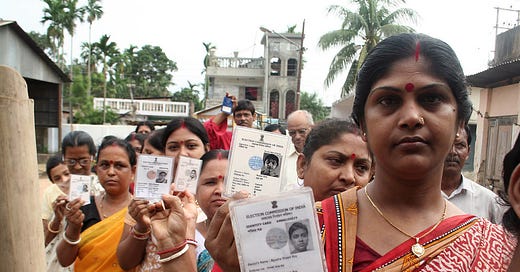2024 Winter Session: The Buzz Over the ‘One Nation, One Election’ Bill
By Aakhya India Policy Team
The ‘One Nation, One Election’ Bill, introduced in the Lok Sabha on December 17 by Union Law Minister Arjun Ram Meghwal, aims to synchronize elections across all levels of government in India, potentially on a single day or within a specific timeframe. This proposal seeks to streamline the election process, reducing costs and administrative burdens. The bills, which outline the framework for holding simultaneous elections, received significant support, securing 269 votes in favour and 198 against. Following the vote, the proceedings were briefly adjourned. The proposal has sparked widespread debate on its feasibility and implications for governance.
Why One Nation, One Election?
Lack of Legislative Calendar
NITI Aayog Discussion Paper Analysis of simultaneous elections: The ‘What’, ‘Why’ and ‘How’ (2017) highlights challenges in India’s electoral framework, particularly regarding simultaneous elections. Article 85 mandates no more than six months between Parliamentary sessions, yet frequent state elections disrupt proceedings, with MPs often engaged in campaigning. Unlike countries such as Canada and the UK which host elections based on fixed legislative calendars, India’s irregular schedule hampers legislative efficiency. With 5-7 state elections held annually and Lok Sabha held elections every five years, governance and development are adversely affected. The absence of a synchronized electoral cycle delays policy implementation, disrupts parliamentary functioning, and undermines the timely resolution of critical national issues.
Financial Implications
Election expenses encompass various elements, including polling station setup, staff allowances, transport, temporary facilities, election materials like indelible ink, and miscellaneous costs to ensure smooth polling and counting operations, as outlined in ECI data. The Law Commission of India’s 2018 Report on Simultaneous Elections highlights the significant financial burden of organizing elections.
The table above demonstrates that, despite having fewer Parliamentary Constituencies (PCs), the cost of organizing General Elections in these five states is quite similar to that of State Elections. As a result, in addition to the substantial expenditure of ₹358.63 crore for General Elections, the government incurs further costs during the Assembly elections, ultimately leading to a drain on taxpayers' money. If elections to the State Assemblies are held concurrently with those of the House of the People, no extra expenditure would be involved, apart from the cost of an additional EVM for each polling station and extra election materials (stationery, etc.). Additionally, for larger polling stations, there may be a requirement for some extra polling staff due to the additional EVM.
Impact on Governance due to imposition of Model Code of Conduct
The Model Code of Conduct (MCC) is enforced from the announcement of the election schedule by the Election Commission until the completion of the election process. During Lok Sabha elections, it applies nationwide, and during Legislative Assembly elections, it covers the entire state. As a result, development programs, welfare schemes, and capital projects are largely suspended during their enforcement, except for routine administrative activities. The Parliamentary Standing Committee’s 79th Report highlights that the frequent imposition of MCC causes policy paralysis and governance deficits, hindering government activities for prolonged periods. For instance, MCC was in effect for about 7 months in 2014, disrupting governance across multiple states. Similarly, in 2015 and 2016, MCC disrupted governance for months due to elections in various states. Such frequent disruptions, lasting for about one-third of the year, negatively impact development projects. Holding simultaneous polls could alleviate these interruptions and ensure smoother government operations.
What is the Joint Parliamentary Committee & What's Next?
The Joint Parliamentary Committee (JPC) is a temporary body established by Parliament to conduct a detailed examination of a specific issue or Bill. It includes members from both Houses of Parliament, representing the ruling and opposition parties, and is chaired by a Lok Sabha member chosen by the Speaker. The JPC's composition is decided by Parliament, with no fixed number of members. It is dissolved after completing its task. Although the JPC’s recommendations are advisory and not legally binding, they are often accepted by the government due to extensive stakeholder consultations.
Following the introduction of the 'One Nation, One Election' bill in Parliament, the Joint Parliamentary Committee (JPC) now has 90 days to review the proposal, with the possibility of requesting an extension if necessary. The JPC will thoroughly analyze the bill and collect public feedback. Concurrently, similar discussions can be expected in a All Political Parties Meeting. However, at the same time, the Law Commission is also anticipated to propose simultaneous elections across all three levels of government—Lok Sabha, state assemblies, and local bodies—starting in 2029. Additionally, the Commission may recommend provisions for a unity government to maintain governance stability in the event of a hung legislature.
Second Opinion
Policy Musings with Alok Agrawal Co-Founder of AI4India.org
In this exciting Policy Musings podcast episode, we dive deep into the transformative power of AI in India with key Insights on:
- The AI Explosion: ChatGPT and Beyond
- Fascination vs. Fear: The Future of AI
- AI Regulation: Navigating the Grey Areas
- India's Data Protection Act & AI Models
- ‘Data Daan’ Campaign: Ensuring Accessible, Free Data for AI
- The Role of Government in Shaping the AI Ecosystem
- Geopolitics and AI: What’s at Stake?
- AI's Role in Accessibility, Employment, and Growth
This is a must-listen for anyone interested in understanding AI's rapid evolution and its impact on India’s future!
🎧 Spotify: https://lnkd.in/gNy5qApK
🔗Watch our podcast on YouTube:






